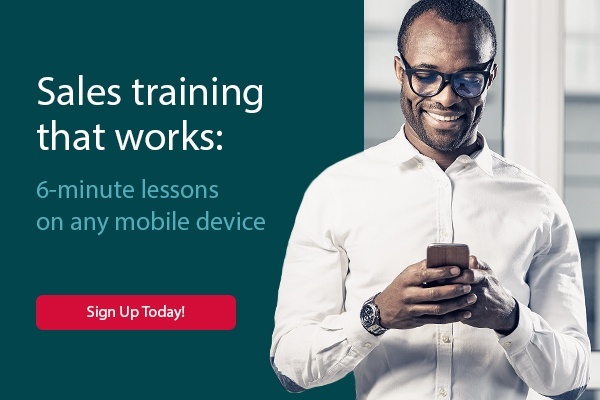Some people say that good salespeople are born, not made. Certainly, there are specific personality traits that top performers share. Steven W. Martin, a professor at USC’s Marshall School of Business, says his research shows that 70 percent of successful salespeople have personality traits that help them sell, and 30 percent have to learn the skills needed to sell effectively. He also estimates that for every 100 people who enter sales but lack natural selling ability, 40 percent will fail, 40 percent will perform at average levels, and 20 percent will become top salespeople.

What those top sales performers share is mastery of specific skills that help them succeed. Our experience shows that even mediocre salespeople can become top performers if they can learn techniques to help them sell. Here is our list of the top 10 sales skills that every top salesperson needs to have:
1. Product-Specific Knowledge
A good sales rep knows what he or she is selling. They should be familiar with all the necessary features and applications, and they should be able to explain how the product works. The best sales reps are able to match the feature and function to customer benefits, tailoring features to the unique needs of a prospect or customer. The deeper the product knowledge, the more effective he or she will be. Moreover, there are actually three dimensions of product-specific knowledge: 1) the specifics of the product being sold; 2) how that product compares with all of the other alternatives the prospect may be considering; and, perhaps more importantly, 3) how that product will produce market-segment-specific and prospect-specific benefits that can be measured on the yardsticks that the prospect is already using to measure their own success. In other words, only knowing all of your own product’s “bells and whistles” is no longer the definition of a good sales rep.
2. Strategic Prospecting
Many organizations have sales development reps (SDRs) to handle cold calling and prequalify inbound leads; however, top performers know how to do more sophisticated prospecting. This means working with referrals that match a specific buyer profile or being able to identify likely prospects from inbound leads. It also means knowing how to revive conversations with closed-lost opportunities. Strategic prospecting also includes getting qualified leads from customer referrals or referrals from company investors and board members.
3. Lead Qualification
In addition to strategic prospecting, top sales reps are adept at lead qualification. Beyond matching a prospect to a specific sales profile, lead qualification includes addressing a prospect’s specific pain points and determining if you can offer a solution. It also means being prepared with alternative solutions if your product or service isn’t a match.
4. Effective Communications
Being able to engage people in a phone call or a meeting is a teachable skill. You have to understand how to use tone of voice, volume, and pace; in other words, it’s not what you say but how you say it. Also, be aware of body language and, if most of your sales are made over the phone, voice tone. In fact, whether you're in-person or on the phone, voice tone is a key ingredient in helping you build rapport.
5. Active Listening
Most sales reps are comfortable pitching a product; however, all too few are good at active listening. Actively listening to a prospect or customer is the only way to understand their needs and expectations. It’s also essential to establishing rapport. The best salespeople are good listeners who can demonstrate empathy and show genuine interest in a prospect’s business and their pain points.
6. Establish Expectations
Before you can close the deal you need to establish rules of engagement. Set expectations in advance of a meeting or sales call. For example, you can establish the expectations for a call—“I’d like to share some successes that our other clients in your industry have been enjoying, and then ask you a few questions about your operation to help me confirm that we could accomplish similarly great results for you.” The objective is to make the prospect feel comfortable and prevent that sense of being ambushed by the sales rep. It also establishes a two-way conversation that will lead to a mutual win at the end of the meeting.
7. Time Management
Time is the enemy of sales. There is never enough time in the day or week to get everything accomplished that will help you reach your sales goals. However, effective time management can give you an advantage. Knowing how to prioritize your work, dealing with unpleasant tasks quickly, and making the most of your time are acquired skills. You also need to know how to use analytics and other sales tools to find leads that are more likely to convert, and know when to abandon a prospect as a waste of time.
8. Handling Objections
Many prospects are quick to say “no.” The sales rep’s challenge is to get to the “why” beyond the “no” and to address each objection to get to the sale. The successful sales rep needs to be adept at identifying specific objections — budget, cost, working with a competitor — whatever the objection may be and resolve those objections in order to close the deal.
9. Know How to Close
Once you have dealt with objections and convinced the prospect that you have the solution they need, it's up to you to close the deal. Often prospects will want to push the closing date back by weeks or even months. Unfortunately, doing so delays the start of whatever benefits your offering would give them. It also gives them a chance to change their mind and doesn’t help you meet your immediate sales quota. Sales reps need to know how to create sufficient and credible urgency to close the deal.
10. Manage the Relationship
The sale doesn’t end when the contract is signed. You have to continue to manage the relationship to make sure the customer knows you appreciate their business and that you are always there to offer support when they need it. Happy customers don’t go to the competition, which is handy since it’s been shown that it’s five times more expensive to sign a new customer as it is to keep a current customer.
Whether you consider yourself a natural salesperson or want to hone your sales skills, you can benefit from sales training. One-to-one sales coaching can help you strengthen areas where you may be weak, and group sales training can refresh those skills that may be getting rusty. Wherever you need help with your selling techniques, Selling Energy has a sales training program to meet your needs.







